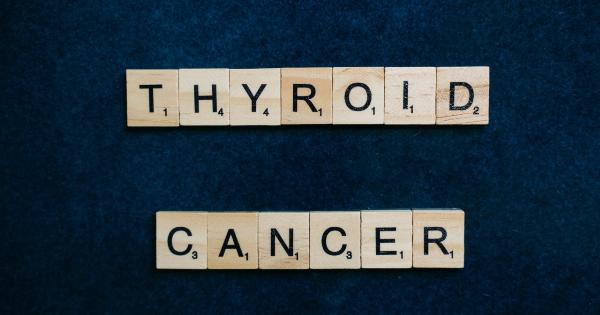The thyroid gland is a small, butterfly-shaped gland located at the base of the neck. Despite its small size, this gland plays a critical role in regulating hormone levels and impacting overall health.
When something goes wrong with the thyroid, it can lead to a range of serious health problems.
What is the Thyroid?
The thyroid is a gland that produces hormones that help control metabolism and regulate various bodily functions. The thyroid gland produces two main hormones: triiodothyronine (T3) and thyroxine (T4).
These hormones help control basic functions like heart rate, body temperature, and metabolism.
When the thyroid gland produces too much or too little of these hormones, it can lead to various health problems. This is why it is important to keep an eye on your thyroid health and watch out for any potential warning signs.
Common Thyroid Problems
Here are some of the most common thyroid problems that people experience:.
Hypothyroidism
Hypothyroidism occurs when the thyroid gland does not produce enough thyroid hormones. This condition is often caused by an autoimmune disorder, but it can also be caused by radiation treatments or surgery that removes part of the thyroid gland.
Symptoms of hypothyroidism include fatigue, weight gain, cold intolerance, constipation, and depression.
Hyperthyroidism
Hyperthyroidism occurs when the thyroid gland produces too much thyroid hormones. This condition is often caused by an autoimmune disorder, but it can also be caused by benign or cancerous growths on the thyroid gland.
Symptoms of hyperthyroidism include weight loss, rapid heartbeat, nervousness, irritability, and difficulty sleeping.
Thyroid Nodules
Thyroid nodules are abnormal growths on the thyroid gland. They are usually benign, but in some cases, they can be cancerous. Most thyroid nodules do not cause any symptoms, and they are often discovered during a routine physical exam.
However, larger nodules can cause problems with breathing or swallowing.
Thyroid Cancer
Thyroid cancer is a relatively rare form of cancer that develops in the thyroid gland. The most common type of thyroid cancer is papillary thyroid cancer, which typically grows slowly and responds well to treatment.
Symptoms of thyroid cancer include a lump or swelling in the neck, hoarseness, difficulty swallowing, and enlarged lymph nodes in the neck.
Diagnosing Thyroid Problems
If you are experiencing symptoms of a thyroid problem, your doctor may perform a variety of tests to help diagnose the issue. These tests may include:.
Blood Tests
A blood test can measure the levels of thyroid hormones in your bloodstream. If your levels are too high or too low, it can be an indication of a thyroid problem.
Thyroid Ultrasound
An ultrasound of the thyroid gland can help your doctor identify any abnormal growths or nodules on your thyroid gland. This can help your doctor diagnose a more serious issue that may require further testing or treatment.
Biopsy
If your doctor identifies a nodule on your thyroid gland, they may recommend a biopsy to check for cancerous cells. During a biopsy, a small sample of tissue is removed from the nodule and examined under a microscope.
Treatments for Thyroid Problems
The treatment for thyroid problems will depend on the specific issue that you are experiencing. Here are some common treatments for thyroid problems:.
Medication
If you are diagnosed with hypothyroidism or hyperthyroidism, your doctor may prescribe medication to help regulate your hormone levels and alleviate your symptoms.
These medications typically need to be taken for the rest of your life to manage your condition.
Radiation Therapy
If you are diagnosed with thyroid cancer, your doctor may recommend radiation therapy to destroy any cancerous cells. Radiation therapy may be used in combination with other treatments, such as surgery or chemotherapy.
Surgery
If you have a large thyroid nodule or cancerous growth, your doctor may recommend surgery to remove part or all of your thyroid gland. In some cases, surgery may be the most effective way to treat thyroid problems.
Preventing Thyroid Problems
While some thyroid problems cannot be prevented, there are things you can do to promote thyroid health and minimize your risks. Here are a few tips for preventing thyroid problems:.
Eat a Healthy Diet
A healthy diet can help promote thyroid function and minimize the risk of thyroid problems. Make sure to eat plenty of fruits, vegetables, lean protein, and whole grains.
Get Regular Exercise
Exercise can help regulate hormones and promote overall health. Aim to get at least 30 minutes of moderate exercise, such as brisk walking or cycling, each day.
Manage Stress
Excess stress can have a negative impact on thyroid function. Try to manage your stress levels through relaxation techniques like meditation, deep breathing, or yoga.
Conclusion
The thyroid gland plays a critical role in regulating hormone levels and overall health. If you are experiencing symptoms of a thyroid problem, it is important to see a doctor as soon as possible.
With proper diagnosis and treatment, most thyroid problems can be effectively managed.




























